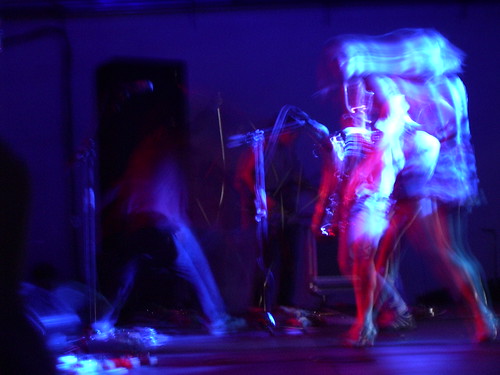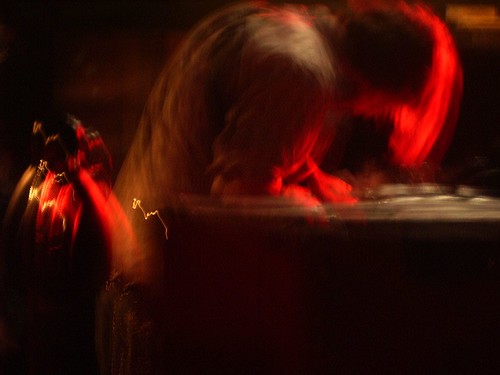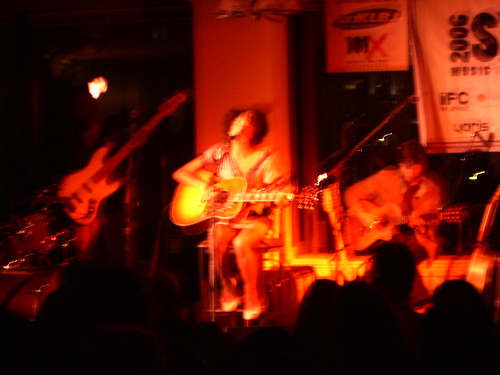[EDIT: re-reading this now, it's actually quite appallingly written; I'm keeping it up here, though, to make sure I never get too swollen a head. x]

The beat - slinky, subtly-funky, ultra-now - is naggingly familiar. So are the vocals - swaggering thug-rap at its capillary-swollen best. But something’s not quite right. Blaring out of radios tuned to the nation’s only national/ised youth station, stocked by the UK’s most mainstream chainstores, this record laughs brazenly in the face of copywright laws, speaking volumes of a generation grown up with sample-culture, democratising consumer technologies and everyday eclecticism: a startling blast of elementary invention which trails with it all manner of subtext involving pop-art and punk-rock and post-modernism.
This epochal record is, quite simply, Dr Dre’s rap from ‘Forget About Dre’ played over an instrumental of Sugababes’ ‘Overload’.
Genius.
It’s not the first - and certainly not the last - such recording. Some of them are witty (Girls On Top’s layering of ‘No Scrubs’ over Kraftwerk), some of them inspired (Soulwax’s splicing of Destiny’s Child’s ‘Survivor’ to 10CC’s ‘Dreadlock Holiday’), some of them just plain bizarre (‘Cigar Ros vs Sealion Dion’, wherein Icelandic shoegazers Sigur Ros’ ‘Bíum Bíum Bambaló’, off the soundtrack to art movie Englar Alheimsins, plays host to the vocal from Mme Celine’s ‘My Heart Will Go Own’, itself the theme to the similarly-esoteric Titanic).
Stretching beyond fad to phenomenon, these are the new bootlegs - some call them ‘Meld Music’, although none of the insiders we interviewed for this piece recognised the term. Great White-Label Wonders, elusive objects of pop desire, brazen enigmas for a mixed-up generation.
The Dre/Sugababes bootleg began as an idle doodle on the part of one Kurtis Rush - a nom-du-pop chosen by the producer for legal reasons [it’s Gary Barlow’s pre-Take That performing guise]. Rush DJs and runs his own club in
Rush discovered the uncanny way the two tracks complimented each other playing records at home, stoned, one night. He connected a minidisk player to his turntables and blended the Dre acapella over the instrumental on the Sugababes flipside, straight through, one take. Then he made an MP3 of the track and whacked it onto Napster, primarily so some overseas friends could enjoy his little creation.
Within hours, some enterprising punter came across Rush’s meisterwerk and decided to press it up on white-label vinyl, hawking it around London’s record shops, claiming it to be the handiwork of a mate up in Manchester. It sold swiftly, and was soon hogging Radio One’s airwaves.
Rush estimates the publishing royalties Dre and Sugababes will receive as a result of the heavy playlisting will run into the thousands. “A friend offered to go to the record labels and demand a remixer’s fee for the record,” he says, although Rush turned him down. He hasn’t seen a single penny’s recompense for the remix, certainly not from sales of the ‘bootleg’ bootleg. He doesn’t even own a copy of the white label that flew off record shelves last year.
“I love to hear the Dre/Sugababes bootleg on the radio. Just knowing that it was recorded in my flat on the most primitive equipment, and ends up getting played next to tracks made by respected producers with 8,000-track studios and every kind of compressor at their disposal,” laughs Rush. “It’s punk, taking from people’s things and mashing it up, making your own thing. You don’t need to go to a recording studio, you don’t need to have a recording contract, you don’t need a producer or a record label or anything. You’re completely breaking the rules and making something that can excite people, you know? I just think that’s kinda subversive.”
Ah, yes, the revolutionary power of meld-music. These bootlegs throw fresh questions into the discussion over cultural/creative ownership, a debate already heated past boiling point by recent developments like peer-to-peer file sharing software (Napster) and the rise of consumer-owned CD-R hardware.
While no record companies we contacted for this feature would openly approve of these bootlegs, they seem tacitly tolerated by The Man - after all, they only flatter those bootlegged, doling upon them hipster cred and attention they mightn’t otherwise have enjoyed [interestingly however, it is rumoured that Fatcat Records, the label behind Sigur Ros, surely the schmindiest and most ‘underground’ artists to be bootlegged, are not best pleased with the ‘Cigar Ros’ record].
“I heard George Michael himself phoned up Radio One for a copy of my George Vs Missy bootleg,” says Rush, of his meld of ‘Faith’ over ‘Get Yr Freak On’. “And I’ve also been told that Missy doesn’t mind bootlegs and I shouldn’t shit myself. I’m not scared of any fucking Record Label. If you make a really crap bootleg, then the record company won’t want it to be out there, but if you do something everyone loves, they’ll do everything in their fucking power to accomodate you. If I do a track that gets their artist on the A-List for six weeks, they ain’t gonna sue me.”
That the labels are so tolerant of such flagrant copywright abuse is endemic of the muddied waters of creative intellectual ownership in the light of recent technological/cultural developments. Napster and the file-sharing software that has followed its demise (Audiogalaxy, Limewire, various permutations of Gnutella) serves as one of the main means of distribution for these contraband grooves, although they’re also available under the counter at hipster record shops, and even on the shelves of uber-corporate chain stores. Meanwhile, cheap, user-friendly sampling programmes for home computers have been available for many years (there’s even a couple for the Playstation), placing such sonic cut’n’paste activities within most consumers’ reach for some time. In fact, some CDs come with this software added on as a multimedia bonus to entice customers to buy the product.
A recent article in Film Threat magazine argued that, by filming in the nascent digital format, George Lucas had empowered the fans who made ‘The Phantom Edit’, the illicit re-edit of 1999’s seriously flawed ‘The Phantom Menace’ Star Wars prequel which excised most scenes involving the odious Jar Jar Binks. Providing consumers with the means to make their own unauthorised remixes, Record Labels can hardly complain when they go and do just that.
“I think there's a certain ‘fuck-you’ attitude that's unavoidable when you work in this area,” explains Rich of Girls On Top, evenly. “Without doing a great deal it can appear that you are some sort of figurehead for an anti-major label/anti-major artist campaign. For me it's a little more respectful towards the original artists. I can think of much better ways to fuck off the major labels.”
“I’m a freak, an obsessive collector; if I see an acapella, BANG, I’m gonna buy it.” So says James Hyman, DJ, broadcaster and bootleg connoisseur. Along with colleague Eddie Temple-Morris, Hyman hosts The Remix on XFM on Sundays between
“Mutiny’s ‘The Virus’, quite a big club tune, has got an acapella on it,” he continues. “ Hip-hop records have had acapella mixes on the flip as a matter of course, but to put an acapella on a tune like that... I reckon someone at their record is hoping there will be a bootleg made of it.”
Hyman’s passion for bootlegs comes from his passion for music. “I always make sure I attend the DMC mixing championships every year,” he explains, “The best thing is when you hear DJs mixing together things which shouldn’t work, but somehow do, like Britney Spears over fierce drum’n’bass, or ‘Ebony & Ivory’ cut over Mantronix’s ‘King Of The Beats’. That kind of thing is just fantastic.
“It all goes back to dub culture, the ‘version’. A ‘version’ is just a tribute, y’know. If I made a bootleg using a Britney Spears vocal, that’s just me saying, I love Britney, this is my take on it. That’s what the show is all about; I played Travis’ cover version of ‘Baby One More Time’ the other day, because, to me, that’s a ‘remix’, a ‘version’...”
But for all Hyman’s allusions to hip-hop and remix culture, just running a vocal track over a beat is hardly the equivalent of the blizzards-of-genius cooked up by The Bomb Squad. Is the meld-bootleg a true work of creativity, or is it simply a shallow act of recontextualising?
“A lot of people think if they just throw together two of the biggest songs, then they’ll have a hit,” spits Rush, the man who, legendarily, spliced Missy Elliot’s ‘Sugarbitch’ to Metallica’s ‘Enter Sandman’. “That’s bullshit, you need to think about rhythm, key-changes; you need to respect the most basic elements of the music. You’ve got to make something completely original, you need to find two things which compliment each other.”
“It's not just about throwing a recognisable acapella over another track or finding hideous singers to mix over trendy records,” adds Rich. “The music I work with and use is quite special to me for one reason or another. The unfortunate side effect of having incredibly good taste like myself is that people assume you're being ‘clever’.”
By making a career out of splicing chart acts like Whitney Houston and TLC over ‘worthy’ rock-crit perennials as Kraftwerk, however, Rich is aware that many will seek to write his recontextualisations off as ironic toss-offs. “I'm aware there's humour and irony in there, but it's certainly not a joke. It’s a dream collaboration, like some alternate Live Aid single for a more tasteful world.”
These bootlegs certainly aren’t ‘anti-music’ caricatures like the grisly work of V/VM or the more highbrow deconstructions of Kid 606. They’re done out of, well, love - for pop, for the artists involved, for the medium. When interviewing ‘Kurtis’ and Rich, I compared their guerilla tactics with those of hackers and virus-makers, who use underhand tactics to flaunt their prodigious talents, like perverse resumes. But they both felt the allusion was off-base.
“Within the last month, I’ve had six offers of remix jobs,” states Kurtis. “One has been a commission to do an official remix, as myself and not Kurtis Rush. The others have been people from record companies saying, ‘if you want the parts from a certain song, you can have them’. But I don’t want the original studio tapes, I need to be able to make the track from the acapellas and instrumental tracks you can buy in the shops; being given the tapes is cheating.
“They can fucking keep their money, because I don’t do it for that. One label actually offered to pay the costs for a bootleg I’d already done; it couldn’t go through any books or whatever, totally under the table. But I turned them down, because I didn’t want their money. This ain’t a fuckin’ career, it’s just fun. Labels should be going out there trying to seek out talent and invest in it, not come along and just fucking throw money at something that’s already happened. I’m old enough to know how the machine works, I’m not interested in it. Even if someone were to offer me a recording contract - what’s the fucking point, you know? I don’t NEED one, if I can do all this without them.”
Fact is, of course, Record Companies and artists profit off the bootlegs regardless of whether the bootleggers approve or are complicit. Just ask Jungle Brothers, whose dormant rap career was fleetingly reanimated by Urban Takeover’s junglist bootleg a couple of years ago, or even Suzanne Vega, who scored a late chart hit when DNA laid hip-hop beats under her neo-folk whimsy.
In his book ‘Bootleg - The Secret History Of The Other Recording Industry’, Clinton Heylin argued that the bootleggers and consumers buying and selling unauthorised studio out-takes and live recordings had a better idea of what artists should be releasing than record labels or, indeed, the artists themselves. The conceit that the customer is always right, taken to the nth degree. “A bootleg is an accolade, a homage,” smiles James Hyman. The sincerest form of flattery, perhaps.




1 comment:
Hmm...sorry Stevie, can I ask you what kinda work are you in?
I'm trying to be a professional J/E translator, and also soon off to Tokyo to meet my Brit friend, to talk 'bout her cookbook's translation this year.
And I noticed yr profile pic is really cool'n'funny. I like it too!
Post a Comment